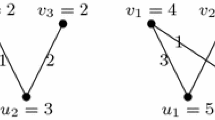Abstract
The Maximum-Flow problem is a classical problem in combinatorial optimization and has many practical applications. We introduce a new variant of this well known Maximum-Flow problem, viz., the Maximum-Equal-Flow problem,wherein, for each vertex (other than the source) in the network, the actual flows along the arcs emanating from that vertex are constrained to be equal and integral. Surprisingly, unlike the Maximum-Flow problem that is known to admit a polynomial time solution, we prove that the Maximum-Equal-Flow problem is NP-Hard. Nevertheless, we provide an approximation algorithm for the Maximum-Equal-Flow problem. We develop a new (analogous) theory for Equal-Flows in networks and also illustrate the Maximum-Equal-Flow equivalents of the fundamental results in flow theory.
Financial support from Infosys Technologies Limited, India, is acknowledged.
Access this chapter
Tax calculation will be finalised at checkout
Purchases are for personal use only
Preview
Unable to display preview. Download preview PDF.
Similar content being viewed by others
References
P. Elias, A. Feinstein, and C. E. Shannon. Note on maximum flow through a network. IRE Trans. Information Theory, IT-2, 1956.
L. R. Ford and D. R. Fulkerson. Flows in Networks. Princeton University Press, Princeton, N. J., 1962.
M. R. Garey and D. S. Johnson. Computers and Intractability: A Guide to the Theory of NP-Completeness. W. H. Freeman and Company, 1979.
C. H. Papadimitriou. Computational Complexity. Addison-Wesley Publiction Company, 1994.
Author information
Authors and Affiliations
Editor information
Editors and Affiliations
Rights and permissions
Copyright information
© 2002 Springer-Verlag Berlin Heidelberg
About this paper
Cite this paper
Srinathan, K., Goundan, P.R., Kumar, M.V.N.A., Nandakumar, R., Rangan, C.P. (2002). Theory of Equal-Flows in Networks. In: Ibarra, O.H., Zhang, L. (eds) Computing and Combinatorics. COCOON 2002. Lecture Notes in Computer Science, vol 2387. Springer, Berlin, Heidelberg. https://doi.org/10.1007/3-540-45655-4_55
Download citation
DOI: https://doi.org/10.1007/3-540-45655-4_55
Published:
Publisher Name: Springer, Berlin, Heidelberg
Print ISBN: 978-3-540-43996-7
Online ISBN: 978-3-540-45655-1
eBook Packages: Springer Book Archive



